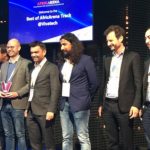We all have them. Those apps we open without thinking. Not because we need anything in particular, but because they feel… safe, in some…
Nine SA, Zimbabwean startups selected for BioCiTi programme

The Cape Innovation and Technology Initiative (CiTi) has announced the names of nine SA and Zimbabwean biotech entrepreneurs that have been selected to take part in BioCiti, a six-month training programme in Cape Town.
The programme, which will run at the Bandwidth Barn, is being run in partnership with SA’s OneBio and The TechVillage from Zimbabwe.
In a statement on Friday (17 May) the CiTi said it received over 50 applications, following an extensive search earlier this year for SA and Zimbabwean biotech entrepreneurs.
The Citi has announced the names of nine SA and Zimbabwean biotech startups selected for BioCiti, a six-month training programme
The nine startups chosen to participate in the BioCiTi and OneBio immersion bootcamp are:
CapeBio Technologies develops life science laboratory research biologics sourced from African indigenous biodiversity hotspots. CapeBio has a bioprospecting platform to develop only the “best-in-class” biologics in the world that will revolutionise the life science industry. Its current product portfolios include highly competitive Polymerase Chain Reaction (PCR) kits, Molecular DNA cloning kits and genome editing tools.
Gourmet Grubb redefines the way people perceive consuming insects. They have developed the world’s first dairy alternative made from insect larvae which is used in a variety of products to support global food security while reducing the human impact on the environment.
MyBiome will disrupt the field of probiotics by providing a personalised microbiome-derived product that is far superior to probiotics in preventing the gut-related illnesses linked to the use of antibiotics.
PharmaHealth Technologies empowers patients to own and manage their comprehensive health data while allowing doctors and clinical researchers authorised access in order to deliver data-driven, patient-centric healthcare in Africa.
Tryad aims to solve the health and environmental problems associated with synthetic indigo dye used in the denim industry by producing natural indigo dye made by microbes.
WNNR Biotech provides emerging Zimbabwean farmers with a cost-effective biofertiliser that can promote plant growth, restore soil fertility and increase productivity while gently taking care of the environment.
My BluePrint aggregates healthcare data such as genetics, lifestyle and health goals to develop individualised treatment plans.
D Chem Group helps improve people’s quality of life by providing quality and affordable cleaning products and uses in-house research and development (R&D) expertise to develop innovative products
AlphaKymeric uses plants as expression systems to manufacture proteins and metabolites used in the fields of agricultural, health and research.
The programme will include various bootcamps, virtual workshops, expert coaching sessions and tailored online content. It will culminate in a showcase day where entrepreneurs will pitch their companies to a room full of key local stakeholders.
Also lending support to the programme are The Centre for Proteomic and Genomic Research, the Finnish government through their Southern African Innovative Support (SAIS) initiative and the SA government’s Small Enterprise Development Agency (Seda).
Citi CEO Ian Merrington said in a statement on Friday that the organisation sees a lot of opportunities in biotech to catalyse the sector.
Said Merrington: “There is a lot of nascent activity in the country and Africa, but not much of it comes to fruition in a commercial sense or from the perspective of being able to take it to market and scale. The launch of the BioCiTi incubator continues CiTi’s increased focus on specialised incubation.”
Featured image: jarmoluk via Pixabay

